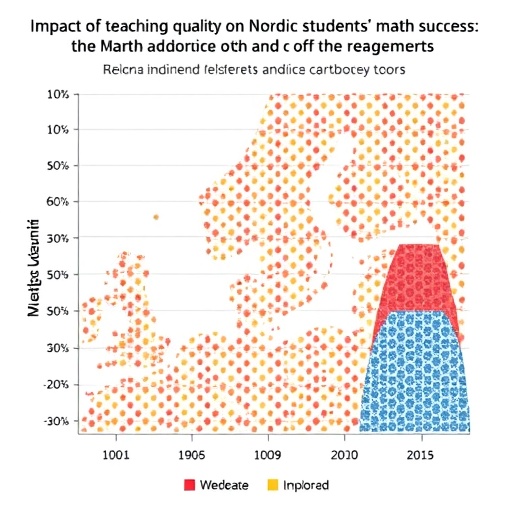In the continually evolving landscape of education, understanding the intricacies of teaching quality and its effects on student outcomes remains a subject of vital importance. A recent study by researchers Asp, Klapp, and Rosén sheds light on this very critical aspect by delving into the relationship between teaching quality and the mathematics confidence and achievement of Nordic primary school students. This research is anchored on the data collected from the 2019 Trends in International Mathematics and Science Study (TIMSS) for grade 4 students across Nordic countries, unfolding significant insights into how pedagogical practices can shape the educational experiences of young learners.
The latest findings indicate that high teaching quality is a decisive factor in enhancing students’ confidence in mathematics as well as their overall achievement in the subject. Amidst the myriad challenges faced by the educational system, this comprehensive study underscores the importance of well-prepared educators who are familiar with effective teaching methodologies. Drawing from a robust multilevel structural equation modeling framework, the research meticulously analyzes data to explore the multifaceted impacts of teaching quality on young learners in an educational milieu that has become increasingly interconnected and competitive.
One of the primary conclusions of the study points to the direct correlation between teaching quality and students’ confidence levels in mathematics. Students who experience high-quality instruction tend to develop a stronger belief in their mathematical capabilities, which can translate into improved performance and higher achievement levels. Conversely, when teaching quality is subpar, students may struggle not only with the subject matter but also with their self-efficacy. This aspect of the study speaks volumes about the psychological dimensions of learning, emphasizing that confidence, often overlooked in educational discussions, plays a pivotal role in academic success.
Moreover, the research highlights the significance of pedagogical approaches that foster an engaging and supportive learning environment. Teaching techniques that encourage active participation, problem-solving, and critical thinking appear to be especially effective in nurturing mathematics confidence among students. This suggests that merely focusing on curriculum delivery is not enough; fostering a classroom atmosphere that is conducive to learning can significantly influence students’ attitudes towards mathematics.
Diving deeper into the implications of these findings, it becomes evident that teacher professional development must prioritize effective instructional strategies tailored to their students’ needs. The role of ongoing training and support for educators cannot be overstated, as it equips them with the tools needed to facilitate optimal learning outcomes. This calls for a systemic approach to professional development, where stakeholders invest in creating a continuum of learning opportunities that keep educators updated with the latest research and teaching practices.
The study also emphasizes the importance of collaboration among educators, where sharing best practices can enhance teaching quality across schools and districts. Collaborative professional development models, where teachers learn from one another and engage in reflective practices, can lead to improvements in instructional methods and, consequently, student outcomes. In a world where educational resources can often be scarce, leveraging the collective knowledge of educators can be a powerful strategy to elevate the overall quality of teaching.
Furthermore, the researchers note that socio-economic factors and access to resources may play a role in the observed disparities in teaching quality and student confidence levels. Addressing these inequalities is essential for creating an equitable education system where all students, regardless of their background, have opportunities to succeed. Policies aimed at providing additional resources to underperforming schools and incentivizing high-quality teaching can help create a more balanced educational landscape.
Importantly, this research provides a foundation for further studies that can explore different dimensions of teaching quality and its impact on various subjects beyond mathematics. Extending this analysis to other disciplines can offer a holistic view of how teaching practices influence student confidence and achievement across the curriculum. Examining the nuances of teaching quality across different educational contexts, such as urban versus rural settings, could also yield valuable insights that inform targeted interventions.
As educational leaders and policymakers digest these findings, it is crucial to champion teaching quality as a centerpiece of education reform. Strategies that value the input of teachers and prioritize their professional growth can lead to sustainable improvements in student outcomes. With the knowledge that teaching quality significantly affects students’ confidence and performance, there is a compelling call to action to elevate the status of educators within the educational system.
The implications of this study extend beyond the Nordic context, providing a valuable framework for understanding educational quality on a global scale. As countries seek to improve their educational standings in an increasingly competitive world, prioritizing teaching quality could prove pivotal in achieving desired outcomes. By investing in high-quality teaching, nations can better equip their young learners with the skills and confidence necessary to thrive academically and socially.
In conclusion, the study by Asp, Klapp, and Rosén not only answers critical questions surrounding teaching quality and student outcomes but also paves the way for ongoing conversations about the future of education. It highlights the need for a robust educational ecosystem that supports both teachers and students, ultimately fostering a generation of learners who are confident in their abilities and prepared for the challenges ahead. The correlation between teaching quality and student confidence and achievement stands as a reminder of the profound impact that educators can have on the lives of their students, a realization that must drive future educational policies and practices.
Subject of Research: The impact of teaching quality on Nordic primary school students’ mathematics confidence and achievement.
Article Title: Does teaching quality matter for Nordic primary school students’ mathematics confidence and mathematics achievement? A multilevel structural equation analysis of Nordic TIMSS 2019 grade 4 data.
Article References:
Asp, L., Klapp, A. & Rosén, M. Does teaching quality matter for Nordic primary school students’ mathematics confidence and mathematics achievement? A multilevel structural equation analysis of Nordic TIMSS 2019 grade 4 data.
Large-scale Assess Educ 13, 7 (2025). https://doi.org/10.1186/s40536-025-00238-x
Image Credits: AI Generated
DOI:
Keywords: Teaching quality, mathematics confidence, student achievement, Nordic TIMSS 2019, primary education, professional development, educational policy.




